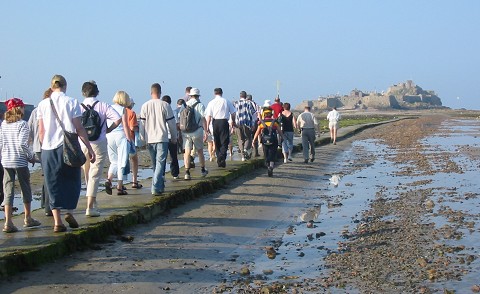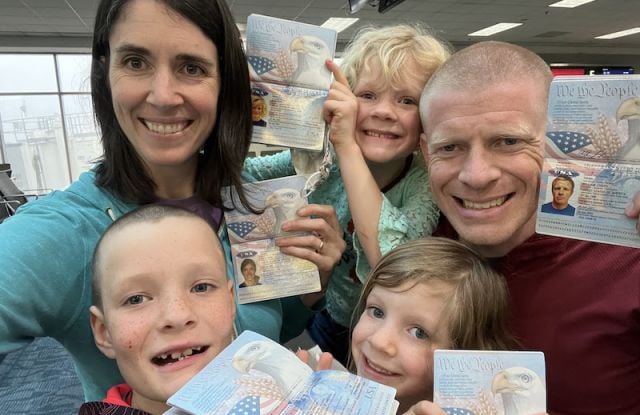
It's February. Just about everywhere it's gray and cold. Whatever is wrong in your life bubbles up as a general angst rooted in monotony. And in the background is perhaps this unformed question, "Is this all there is?"
Another way of asking the question is, "Where is the transcendence?" It's a question that gets answered on a pilgrimage, something we all need.
While I've been taking time off from the blog, I've been studying where the idea of a pilgrimage came from. A pilgrimage is a kind of a kingdom journey. What's unique about a pilgrimage is that you know where you're going. You just don't know what adventures you may have along the way.
Think about it – Jesus was born into a culture that required kingdom journeys as a regular part of people's lives. Jesus' was born on a journey his parents were compelled to take. People gave his parents a barn to stay in. And his whole ministry was one big kingdom journey wandering from village to village. Ultimately even his death ended on a mini-journey – the Via Dolorosa.
In ancient Israel, three times a year, the nation would travel to Jerusalem to celebrate a festival. God in the Bible (the Torah – Ex. 23) mandated that his people regularly leave home in order to attend a national party. God understands our need to be pulled out of our monotony and self-sufficiency to be reminded of his transcendence.
So God mandated a regular kingdom journey becauses he knew we needed to practice relying on him, moving to a place of dependency. We all want to know he exists and cares for us, but most of us need help in moving toward intimacy that we feel when he provides for us in our hour of need.
So his people went on a pilgrimage to celebrate:
They walked/journeyed the dusty back-trails to the party site. If Jews are a reviled minority around the world, they are at least cohesive. And that cohesion was formed in part by the journeys embedded in their national psyche.
What do we have as a correlary in our modern day? Well, we don't have much. And so, most American Christians never learn to depend on God. "Give us this day our daily bread" is an anachronism. Why pray for bread when there's already so much of it that most of us are struggling to find that one diet that will do the trick?
Yes, we have short-term missions trips, but only a small percentage of Christians go on them. Most STMs come pre-loaded with carefully defined itineraries – sapping the journey of its power. They are a far cry from the pilgrimages of ages past.
Down through history there have been journeys that resembled the ones that Jesus went on, some ironically planned by the enemies of the faith.
My friend Marty Schoffstall had an old Filippino friend who saw the Bataan Death March. Thousands of POWs were killed by their Japanese captors along their way. He compared it to Jesus' last journey, the Via Dolorosa. Both were a march toward death, the condemned forced along by their captors.
We grow up living in an instant drive-thru culture and need to rediscover our roots. We particularly need our roots as pilgrims along a special part of life's road – the part where we leave home and meet God somewhere unexpected over the horizon.
Applying This
If God mandated journeys so that we would learn to depend on him, then we perhaps we need them more than we realize. Consider going on a Luke 10 journey that requires you to ask God for daily bread. To rediscover transcendence, consider practicing a discipline that leads you to dependence.
We all deserve the chance to depend on God in intentional ways. We deserve the opportunity to see our faith grow on a kingdom journey.
Have you gone on a journey that has caused you to really depend on God in a way that shook you? What did it do to your faith? What did you take away?




This is an opinion from the heart of someone who loves and respects you deeply, Seth, and all those who “are able” to leave home. The majority of Christ followers will never experience a foreign land, but without a doubt God will set us up (numerous times) on our pilgrimage/kingdom journey where we become broken and in desperate need of complete dependency on Him. It could be in a challenging job, poor health, relationships, or overwhelming living situations. It doesn’t seem to matter how much, or how little I have in comforts and material possessions. I have been on a few missions trips, but my complete brokeness has come over and over again when I ask, “WHY”: did that baby die; is that 5 year old boy being held hostage in a bunker; did that young pastor die of cancer while the whole church was believing for a miracle; is by husband a workaholic; did a theatre full of people die watching a movie; does my child lie; do I tithe and still not have enough money; won’t my family and neighbors believe in Jesus; have I not been healed; did I uproot my family because I believed God spoke-but it didn’t “turn out”? And my complete dependency has come over and over again when I chose to replace the word “why” with TRUST. I have been broken, surrendered, trusted, completely dependent, and worshiped Him in my bathroom, bedroom, living room, porch, car, side of the road, ocean, stationary bike, holding a baby, a hospital room, a bus in Mexico, a tin roof church in Haiti, an airplane. Our entire lives are pilgrimages/kingdom journeys. In the definition of pilgrimage it states: any long journey, especially one undertaken as a quest … to pay homage. May our lives be quests to pay homage to our Savior, no matter what the landscape looks like around us.
Seth, The journey in most of today’s mission trips do indeed lack of the need for dependence on God. You have helped me define what we now do on our Wipe Every Tear short term journeys.
Within those journeys you are aware of MY OWN journey. It is both painful and joyful. Just today, we suffered the disappointment of a precious girl who is trafficked in the sex trade, come to the Hope House from another city 3 hours away. She spent the night as we cared for her and demonstrated the love of Jesus.
She came close to staying for good, but the snares of the evil sex industry has her tricked and deceived that she MUST return. And so we watched her leave this afternoon only to return to the hell hole of a “beautiful looking” bar with deceptions so deep that precious women feel there is NO WAY IN HELL TO GET OUT!
My heart is broke on this journey today . Thank you for being there to help me walk another day.
Kenny – thanks for inspiring us with your example and your stories. Your journey makes possible the journey toward hope of so many others.
I desperately need this kind of journey…I am finding the seeds for beginning this journey as a way of life through my time at George Fox, but honestly, I delude myself as I live in such comfortable surroundings, physically I don’t imagine ever needing to depend on God, and that brings grief to my soul. But spiritually He is leading me on another journey, and that is exciting! But I know there is so much more. Thanks for giving us a window to see that through.
Even if we here in America don’t need physical daily bread, we do need Him, the Bread of Life. So, spiritually, we remain, whether in need or well-supplied naturally, in need of Him daily. I know that in my own pilgrimage, if I don’t rely on Him, I suffer in terms of being misguided at the least, to being unprotected and vulnerable to the lies of the enemy, and subject to his destructive and death desiring schemes. So perhaps the journey is more internal than external, and the destination is plumbing more and more of the depths of who He is and can become in and through us, and by knowing and trusting in who He is causes us to want to depend on Him fully.
As I have relayed to one of my coworkers some of the adventures God has given L Squad, he has commented, “I don’t know what kind of an outfit this group is but they seem squirrely and unorganized. I can’t think I’d recommend them.” I don’t think he sees the gift of dependence. And maybe most American Christians think of STMs as a (merely) preplanned/packaged vacations with a higher purpose and miss the point of a Kingdon Journey.
Sure painting a church building and helping with a VBS are important activities with lasting value and seeing real (3rd world) poverty has to be life changing too. But a Kindom Journey looks like it changes SO MUCH more. And like so much else about Church here in the states, Good misses Great.
Thanks for continuing to point the way.
BUT…
I don’t have the time
I owe too much money
I’m not sure I will like what I see
I am comfortable where I am at
What do I have to offer
Some day…
I am scared of what I may discover…
I am amazed at how God changes me, my heart and my desires as I step out to follow Him over me.
Dear Anonymous,
Thanks for loving and respecting me.
I’m not advocating a foreign land – just advocating journey as the venue for discipleship. Just noting that it was God’s tool with the ancient Hebrews and the tool Jesus used with his disciples. Nowhere (other than a few homes) do we see buildings as a venue. We see rivers, mountains, lakes and trails.
And you are right, God will use all kinds of things to wreck us. That said, the quest for comfort is inexorable and dumbs down our spirits. It needs to be fought and while waiting for the next faith-testing crisis, journey is a good tool to activate the dumbed-down spirit.
Anonymous, the theology of chagag (Hebrew for pilgrimage), was pretty simple, in your own country you were to walk to the place of worship and feasting without an empty hand. people were to be willing to help others on this walk. each of us need to find this, maybe it is a once a year dawn walk to our place of worship (like a church). I’d like to see AIM construct one in the US at Zion National Park. Then we can all tell our stories. Each chagag was storied, consider the story of the RETURN from Jerusalem when Jesus was 12. That was where the story was.